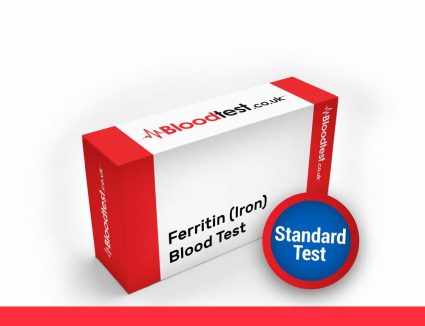Comprehensive Guide to Ferritin Blood Testing for Optimal Health
Explore Ferritin: The Essential Protein for Iron Storage and Overall Wellness

The Ferritin Blood Test in Inverness is a vital health assessment tool, as ferritin is a crucial protein that serves as the primary storage molecule for iron in the human body. This essential protein acts as a reservoir, releasing iron as needed for various critical physiological functions, including the formation of red blood cells. Keeping ferritin levels within a healthy range is essential for maintaining overall well-being, as imbalances can indicate either iron deficiency or iron overload. Medical conditions such as anaemia, which often results from low iron levels, and haemochromatosis, characterised by excessive iron accumulation, can be identified through a ferritin blood test. Recognising the critical function of ferritin is vital for effectively managing these health conditions, making the ferritin blood test in Inverness an indispensable diagnostic tool for many individuals.
Why Ferritin Level Testing is Essential for Your Health Management
Testing ferritin levels is crucial for diagnosing and managing a range of health concerns. If you’re experiencing symptoms such as fatigue, weakness, or unusual cravings, a ferritin test may uncover underlying health issues. Low ferritin levels typically signal iron deficiency, which can stem from inadequate dietary intake or chronic blood loss. On the other hand, elevated ferritin levels may indicate iron overload or inflammatory conditions, necessitating further medical investigation. Understanding where your ferritin levels stand in relation to the normal range enables healthcare professionals to recommend suitable treatment options, ensuring effective health management. Consequently, the ferritin blood test in Inverness is a fundamental measure for anyone concerned about their iron status or associated health challenges.
Curious About the Audio Version of This Informative Guide?
 Steps for a Seamless Ferritin Test Experience
Steps for a Seamless Ferritin Test Experience
Undergoing a ferritin blood test is an uncomplicated and efficient procedure. Usually performed in a clinical environment, the test begins with a healthcare professional cleansing the area on your arm before drawing a blood sample, typically from a vein. The whole process is quick and involves minimal discomfort, making it suitable for those who may feel uneasy about needles. After the blood sample is collected, it is dispatched to a laboratory for detailed analysis, where your ferritin levels are evaluated and reported back to your healthcare provider. This rapid turnaround ensures individuals receive timely insights into their iron status, establishing the ferritin blood test in Inverness as a critical component of routine health assessments.
Key Preparations Required Before Your Ferritin Blood Test

Actionable Steps to Prepare for Your Ferritin Test
Preparing for a ferritin blood test is generally straightforward since no specific fasting or dietary restrictions are typically necessary. However, it is crucial to inform your healthcare provider about any supplements or <a href=”https://bloodtest.co.uk/ferritin-blood-test-in-coatbridge-essential-insights/”>medications</a> you are currently taking, as some substances can affect ferritin levels. For example, taking iron supplements prior to testing might result in falsely elevated results. Honesty regarding your health status and lifestyle choices is vital for your doctor to accurately interpret the results. This simple yet critical step guarantees that your ferritin blood test in Inverness produces results that genuinely reflect your iron stores and overall health status.
What Should You Expect During the Ferritin Blood Testing Process?
The ferritin blood test is designed to be quick and as painless as possible. A healthcare professional will employ a small needle to draw blood, typically from a vein in your arm. While some individuals may feel a slight pinch or discomfort, the entire procedure usually lasts only a few moments. Once the blood is collected, the site will be covered with a bandage to prevent bleeding. Most people find they can resume their daily activities immediately after the test, providing convenience throughout the health assessment process. Thus, the ferritin blood test in Inverness can easily fit into your busy schedule without causing significant disruption.
What Happens Next After Your Ferritin Test?

After you complete the ferritin blood test, you can typically return to your regular activities without delay. This swift return to routine is one of the many advantages of this straightforward testing method. Results typically become available within a few days, allowing your healthcare provider to discuss the findings with you promptly. Understanding your ferritin levels is vital, as this information can guide further testing or treatment if necessary. By keeping track of your ferritin status, you can take proactive steps towards improved health management, highlighting the critical importance of the ferritin blood test in your healthcare journey in Inverness.
How to Interpret Your Ferritin Test Results for Better Health Insights
Once your ferritin levels are assessed, it is essential to understand what these results mean for your health. A healthcare provider will clarify the normal ranges of ferritin levels and their implications for your overall health status. Typical normal ferritin levels can vary depending on factors such as age and gender, which will be factored in when interpreting your results. If your levels are outside the normal range, your doctor will discuss possible implications and whether additional action or monitoring is required. This discussion is vital for ensuring that any health concerns are promptly addressed, underscoring the significant role of the ferritin blood test in Inverness in comprehensive health evaluations.
Understanding Ferritin Test Results for Effective Health Management
Recognising Normal Ferritin Levels for Your Well-Being
Normal ferritin levels are crucial indicators of iron status in the body, typically ranging between 20 to 250 micrograms per litre for adults, with variations depending on age and gender. Keeping ferritin levels within this range is essential for optimal health, as it signifies adequate iron storage and availability for critical bodily functions. For instance, women often present with lower normal ranges compared to men due to menstrual blood loss, necessitating careful monitoring. Grasping these benchmarks empowers individuals and healthcare providers alike to make informed decisions regarding diet, supplementation, and overall health management. Regularly assessing ferritin levels can empower you to make proactive choices about your health, reinforcing the significance of the ferritin blood test in Inverness as a standard aspect of health management.
Identifying High Ferritin Levels and Their Potential Health Implications
Elevated ferritin levels can indicate various health issues, including iron overload, liver disease, or chronic inflammatory conditions. High ferritin levels may suggest that the body is storing excess iron, which can lead to complications if not properly managed. Conditions like haemochromatosis, where the body absorbs excessive iron from food, require careful management to prevent damage to vital organs such as the liver and heart. Further investigations are often warranted to identify the underlying cause of elevated ferritin levels, which may involve additional blood tests or imaging studies. Understanding these implications reinforces the necessity of regular monitoring and intervention, emphasising the critical role of the ferritin blood test in Inverness for early detection and management of potential health risks.
Understanding Low Ferritin Levels and Their Impact on Your Health
Low ferritin levels generally suggest iron deficiency, frequently linked to conditions like anaemia. When ferritin levels drop below the normal range, it indicates that the body’s iron stores are insufficient to meet its physiological demands. This deficiency can lead to symptoms such as fatigue, weakness, and impaired immune function. Dietary adjustments or iron supplementation might be necessary to correct low ferritin levels, with healthcare providers usually overseeing this process to ensure safety and effectiveness. Recognising the implications of low ferritin levels is crucial for anyone experiencing related symptoms, highlighting the essential nature of the ferritin blood test in Inverness for early detection and timely intervention.
Where to Access Ferritin Testing in Inverness
Utilising NHS Services for Ferritin Testing in Your Community
Residents of Inverness can access ferritin testing through NHS Highland, providing a dependable option for individuals looking to monitor their iron levels. Typically, a referral from your General Practitioner (GP) is required to initiate the testing process, ensuring that the service is efficient and customised to individual health needs. Local health centres in Inverness are well-equipped to perform these tests, offering convenient access within the community. Engaging with NHS services guarantees that individuals receive high-quality care, making the ferritin blood test in Inverness an accessible resource for maintaining health and well-being.
Exploring Private Clinic Options for Rapid Ferritin Testing
For those seeking quicker turnaround times or more flexible scheduling options, various private clinics in Inverness offer ferritin testing services. These clinics often present a more streamlined experience, permitting patients to book appointments directly without needing a GP referral. This can be particularly beneficial for individuals who prefer a proactive approach to their health management. Private clinics may also provide additional services or more personalised care, making them an appealing alternative for those looking to monitor their ferritin levels efficiently. The availability of such options underscores the significance of the ferritin blood test in Inverness for anyone prioritising their health and well-being.
Utilising At-Home Testing Kits for Convenient Ferritin Monitoring
The advent of at-home testing kits has made it increasingly convenient for individuals to monitor their ferritin levels from the comfort of their own homes. Numerous companies offer ferritin testing kits available for purchase online, allowing you to collect a small blood sample independently. These kits typically include comprehensive instructions and all necessary materials to send the sample to a laboratory for thorough analysis. While at-home testing provides convenience, it is essential to ensure that the kit is reputable and that the laboratory conducting the analysis is accredited. This innovative approach to health monitoring expands access to the ferritin blood test in Inverness, empowering individuals to take charge of their health journey.
Effective Strategies for Managing Abnormal Ferritin Levels
Professional Treatments for Elevated Ferritin Levels
Managing high ferritin levels often requires professional intervention, as elevated iron levels can pose significant health risks. Treatment options may involve phlebotomy, a procedure where blood is regularly drawn to reduce iron levels, or chelation therapy, which entails administering medications to bind excess iron and facilitate its elimination from the body. These strategies are typically overseen by healthcare professionals who can tailor treatment plans to meet individual needs. Regular follow-up testing is crucial to monitor ferritin levels and ensure that treatment remains effective. Understanding and managing high ferritin levels is vital for preventing complications, highlighting the importance of the ferritin blood test in ongoing health management.
Addressing Low Ferritin Levels: Effective Management Strategies
When ferritin levels are low, the first step in management is often to increase iron intake. This can be accomplished through dietary changes, such as including more iron-rich foods like red meat, legumes, and dark leafy greens in your diet. Additionally, iron supplements may be recommended, but it is essential to consult with a healthcare provider to determine the appropriate dosage and type of supplementation. Addressing underlying causes of iron deficiency, such as chronic blood loss, may also be necessary. Understanding the steps to manage low ferritin levels is crucial for enhancing overall health, making the ferritin blood test in Inverness essential for effective management.
The Importance of Continuous Monitoring and Follow-Up for Ferritin Levels
Regular monitoring of ferritin levels is critical for individuals with abnormal results. Follow-up tests help track changes in iron levels, enabling healthcare providers to adjust treatment plans as required. This ongoing evaluation is especially important for those receiving treatment for high or low ferritin levels, as it ensures that interventions are both effective and safe. Furthermore, follow-up consultations provide opportunities to discuss any new symptoms or health concerns, reinforcing the significance of ongoing engagement with healthcare services. The ferritin blood test in Inverness thus serves as a crucial tool in promoting long-term health and well-being.
Identifying the Root Causes of Abnormal Ferritin Levels
Understanding the underlying causes of abnormal ferritin levels is essential for effective management. High ferritin levels can arise from various conditions, including liver disease, chronic inflammation, or genetic disorders like hereditary haemochromatosis. Conversely, low ferritin levels are often linked to dietary deficiencies, malabsorption issues, or blood loss from conditions such as gastrointestinal bleeding or heavy menstruation. Identifying these root causes enables healthcare providers to develop treatment strategies that address the underlying issue rather than merely alleviating symptoms. This comprehensive approach highlights the importance of the ferritin blood test in Inverness in ensuring that individuals receive timely and appropriate care.
Integrating Lifestyle and Dietary Strategies for Optimal Ferritin Levels
Creating a Nutritional Plan to Boost Iron Levels
Maintaining healthy ferritin levels largely depends on dietary choices. Consuming iron-rich foods is essential for boosting your body’s iron stores. Red meat, poultry, and fish are excellent sources of heme iron, which is readily absorbed by the body. For vegetarians or those looking to increase their intake of plant-based foods, legumes, lentils, tofu, and dark leafy greens like spinach can provide non-heme iron, although they are absorbed less efficiently. Pairing these foods with sources of vitamin C, such as citrus fruits or bell peppers, can further enhance iron absorption. Considering these dietary strategies is vital for maintaining optimal ferritin levels, reinforcing the significance of the ferritin blood test in Inverness for anyone concerned about their iron status.
Examining the Role of Supplements in Iron Absorption
For individuals who cannot meet their iron needs through diet alone, iron supplements can be crucial for maintaining healthy ferritin levels. However, the type and dosage of supplements should be carefully monitored, as excessive iron intake can lead to toxicity. Vitamin C plays a significant role in enhancing iron absorption, making it beneficial to consume alongside iron supplements or foods rich in iron. Conversely, specific foods and medications can hinder iron absorption. For instance, calcium, tannins found in tea, and phytates in whole grains can impede iron uptake. Understanding these interactions is vital for optimising iron levels and ensuring effective management of ferritin levels, showcasing the relevance of the ferritin blood test in Inverness in monitoring health.
The Importance of Hydration in Supporting Iron Levels
Maintaining adequate hydration is another critical factor in sustaining optimal iron levels within the body. Proper hydration supports various bodily functions, including nutrient transport and absorption, which are essential for efficient iron utilisation. Dehydration can disrupt these processes, potentially leading to issues with iron levels. Drinking water throughout the day and incorporating hydrating foods into your diet can promote overall health and facilitate the effective transport of iron. This awareness underscores how lifestyle factors, such as hydration, can impact ferritin levels, highlighting the role of the ferritin blood test in Inverness as part of a holistic approach to health management.
Exploring Lifestyle Influences on Iron Levels
Various lifestyle factors can significantly impact iron levels and, consequently, ferritin levels in the body. Regular exercise is known to enhance circulation and overall metabolic health, positively influencing iron utilisation. In contrast, high-stress levels can negatively affect iron metabolism and absorption. Additionally, smoking has been associated with lower iron levels, emphasising the importance of addressing lifestyle choices to support optimal health. By understanding these influences, individuals can take proactive measures to ensure their ferritin levels remain within a healthy range, further highlighting the relevance of the ferritin blood test in Inverness for ongoing health assessments.
Common Questions About Ferritin Testing
What is the primary objective of a ferritin blood test?
A ferritin blood test quantifies the amount of ferritin in your blood, reflecting your body’s iron stores. This test is instrumental in diagnosing iron deficiency or overload, guiding treatment decisions accordingly.
How frequently should I have my ferritin levels assessed?
The frequency of ferritin level assessments depends on individual health requirements. Those with known iron deficiencies or conditions of iron overload may need regular monitoring, while others might only require annual tests.
Are there any risks connected to the ferritin blood test?
The ferritin blood test is generally safe and presents minimal risks. The most common side effect is minor discomfort or bruising at the site where blood is drawn.
What does it indicate if my ferritin levels are low?
Low ferritin levels typically suggest iron deficiency, which can lead to conditions like anaemia. This may require dietary changes or supplementation under the guidance of a healthcare provider.
What are the implications of having high ferritin levels?
High ferritin levels can indicate iron overload or inflammation, potentially signalling conditions such as haemochromatosis or liver disease, which may necessitate further examination.
Can I eat before undergoing the ferritin blood test?
Typically, no special dietary restrictions are necessary before a ferritin blood test. However, it is crucial to inform your doctor about any supplements or medications you are currently taking.
How long will it take to receive my ferritin test results?
Results from a ferritin test are usually available within a few days, allowing for timely discussions between patients and healthcare providers regarding findings and next steps.
Do ferritin levels vary over time?
Yes, ferritin levels can fluctuate based on numerous factors, including dietary intake, recent illness, and overall health status. Regular testing helps effectively monitor these changes.
What foods can assist in raising ferritin levels?
Incorporating iron-rich foods, such as red meat, poultry, fish, legumes, and leafy greens into your diet can significantly help increase ferritin levels. Pairing these foods with sources of vitamin C enhances iron absorption.
Is there a distinction between ferritin and serum iron levels?
Yes, ferritin measures the stored iron in your body, while serum iron quantifies the amount of iron circulating in your blood. Both tests provide valuable insights into your iron status.
Connect with us on Facebook!
This Article Was Originally Published On https://bloodtest.co.uk
The Article Ferritin Blood Test: Your Essential Guide in Inverness Was Found On https://limitsofstrategy.com
References:
https://limitsofstrategy.com/ferritin-blood-test-your-essential-guide-in-inverness-2/



